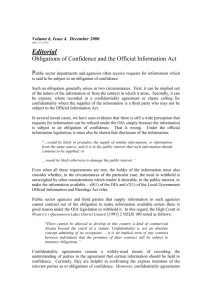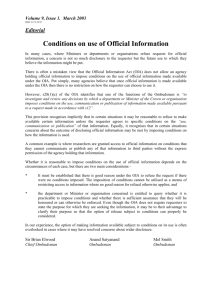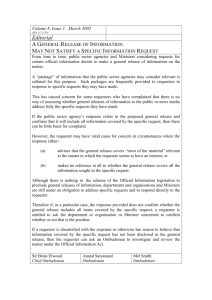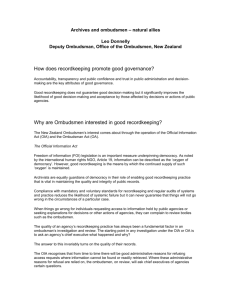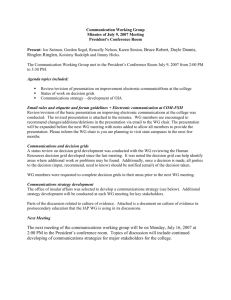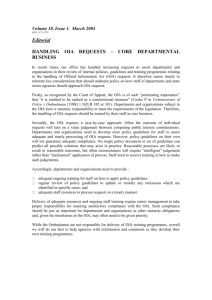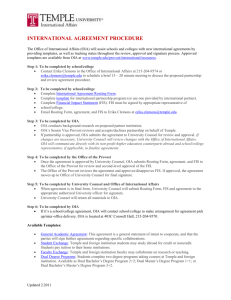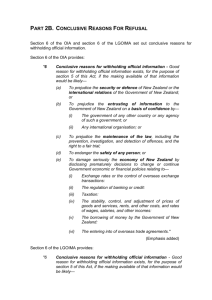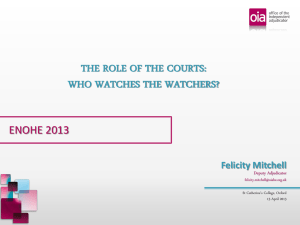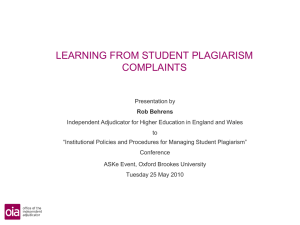DOC - Office of the Ombudsman
advertisement
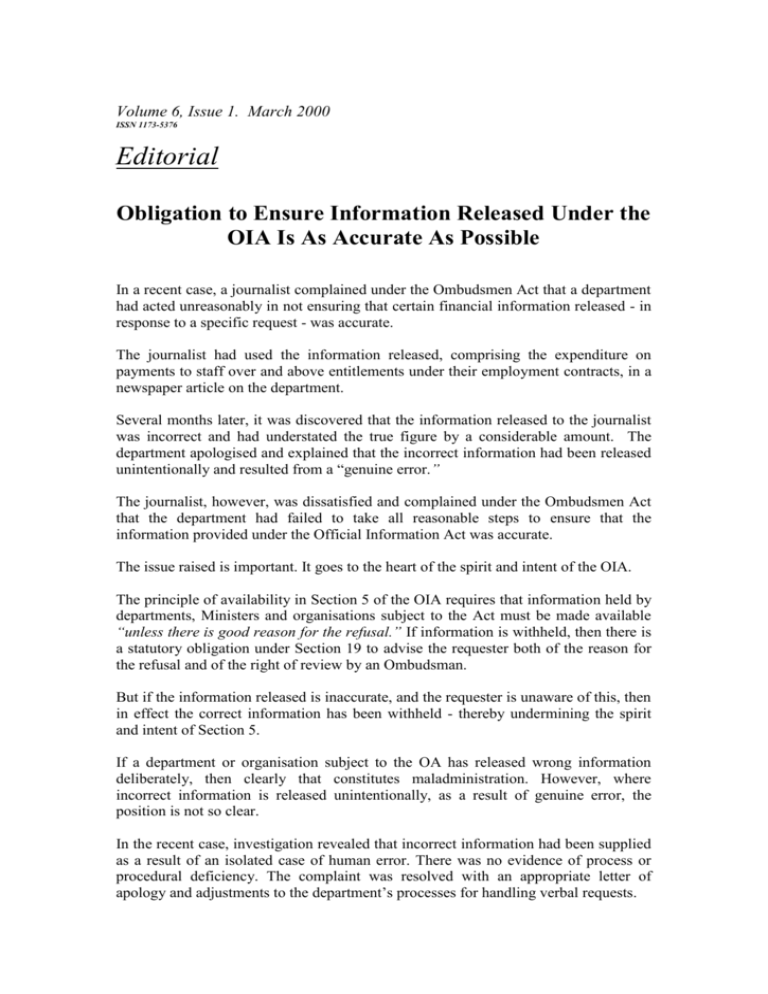
Volume 6, Issue 1. March 2000 ISSN 1173-5376 Editorial Obligation to Ensure Information Released Under the OIA Is As Accurate As Possible In a recent case, a journalist complained under the Ombudsmen Act that a department had acted unreasonably in not ensuring that certain financial information released - in response to a specific request - was accurate. The journalist had used the information released, comprising the expenditure on payments to staff over and above entitlements under their employment contracts, in a newspaper article on the department. Several months later, it was discovered that the information released to the journalist was incorrect and had understated the true figure by a considerable amount. The department apologised and explained that the incorrect information had been released unintentionally and resulted from a “genuine error.” The journalist, however, was dissatisfied and complained under the Ombudsmen Act that the department had failed to take all reasonable steps to ensure that the information provided under the Official Information Act was accurate. The issue raised is important. It goes to the heart of the spirit and intent of the OIA. The principle of availability in Section 5 of the OIA requires that information held by departments, Ministers and organisations subject to the Act must be made available “unless there is good reason for the refusal.” If information is withheld, then there is a statutory obligation under Section 19 to advise the requester both of the reason for the refusal and of the right of review by an Ombudsman. But if the information released is inaccurate, and the requester is unaware of this, then in effect the correct information has been withheld - thereby undermining the spirit and intent of Section 5. If a department or organisation subject to the OA has released wrong information deliberately, then clearly that constitutes maladministration. However, where incorrect information is released unintentionally, as a result of genuine error, the position is not so clear. In the recent case, investigation revealed that incorrect information had been supplied as a result of an isolated case of human error. There was no evidence of process or procedural deficiency. The complaint was resolved with an appropriate letter of apology and adjustments to the department’s processes for handling verbal requests. However, on a wider level, an important principle was recognised. Given Section 5 of the OIA, requesters should be able to expect that departments and organisations subject to the Act will take all reasonable steps to ensure that information released is correct. If, in a particular case, there is genuine doubt about the accuracy of information to be released, then it can be made available subject to a contextual statement containing an appropriate caveat. This is now common practice in such cases. Finally, it is the department or organisation that is accountable under the OIA for responding to requests properly. It would not be sufficient to say that the individual handling the request “answered as best they could.” Building plans not always confidential Even if grounds of copywright and security can be made out for withholding details of building plans, they could be outweighed by countervailing factors of public interest favouring release of the details. A project for constructing a building with a public display space, associated small shop and conveniences for visitors, together with residential accommodation for the operator, required resource consent. The application drew objections, but consent was granted on the condition that ‘the facility be established and operated generally in accordance with the plans and details submitted,’ and subject to a number of other conditions. The end result was a somewhat unusual building in a particular shape and style. With construction underway, an objector sought access to the building consent plans because of concerns that the local authority might have approved, for construction purposes, plans which differed in material ways from those that had been approved at the resource consent stage. Access was declined. The developer had marked his application for building consent as “confidential” in terms of the Building Act, 1991. However, Section 27(3) of the Building Act declares that it is subject to the Local Government Official Information and Meetings Act (LGOIMA). The developer’s fundamental objection to disclosure was based on the fear that, if given access to the plans, the requester might be able to take action which might delay construction. It was difficult to see how such a concern could be justified. It seemed that the only form of action, based on information in the plans, that might delay the project would be some kind of official intervention. The Ombudsman was guided by an earlier precedent (OQR Vol 3 No 4). On investigation, the Ombudsman concluded that there had been changes to the style and shape of the building since the consent stage, and he considered that refusal of the request would have the effect of concealing these apparent differences. To do so would be contrary to the express purpose of s27(1) of the Building Act “to enable the public to be informed of their obligations and to participate effectively under this Act” - a statutory recognition of the public interest in the availability of such information. The council proceeded to disclose the plans. Unnecessary Reviews - a Source of Frustration Ombudsmen do not usually begin or continue with Official Information Act investigations where the information at issue is already in the hands of the requester. There is rarely any practical purpose to be served by doing so. From time to time, however, the Ombudsmen do find themselves investigating the merits or otherwise of withholding information that is already available. This can occur when, during the investigation, the requester receives from a third party the information sought but – for whatever reason – decides not to advise the Ombudsmen that the information has now been received. Less often it happens that the requester has gained information from a source other than the legitimate holder of the information and then seeks an Ombudsman’s investigation and review in the hope that, if the information is released as a result, this will then legitimise their possession of the information and allow them to use it in the public domain. Such situations can be a source of frustration, involving an unnecessary use of the limited resources of the Ombudmen’s Office. INVESTIGATION OF INLAND REVENUE DEPARTMENT A Need to Commit to a New Culture The Ombudsmen have found no evidence to substantiate the allegation that the IRD’s Special Audit Unit had issued a memorandum instructing its staff “to deliberately frustrate the purposes” of the Official Information Act. They undertook an own motion investigation under the Ombudsmen Act to ascertain whether the IRD was discharging properly the legal obligations imposed on it by the OIA – prompted by the allegation. The subsequent report was tabled in Parliament late last year. The terms of reference required examination of the practices generally applied by the IRD. All the staff instructions and memoranda in current circulation on the processing of requests for official information were gathered. The adequacy of the documents provided in light of the requirements of the OIA, as qualified by the secrecy provisions contained in s81 of the Tax Administration Act, was reviewed. The Ombudsmen found a number of circulars and practices which, on their own, could be construed as overstating the restrictions imposed by the TAA and, correspondingly, not sufficiently reflecting the requirements of the OIA. They also examined the memorandum which had prompted the investigation. One sentence of that memorandum, in particular, was expressed in terms which, if taken out of context and without a knowledge of the OIA, could result in incorrect conclusions being drawn. But they found no evidence to substantiate the allegation which prompted the own motion investigation. In the documents provided, there was an insufficient acknowledgement by the IRD of the applicability of the OIA to information held by it. However, the inter-action of the OIA and TAA is a matter of some complexity, and the approach to be taken to it has evolved over time. The IRD acknowledged the need to review its policies in this area and is making progress in remedying the difficulties highlighted. In particular, it has undertaken to review its information policies and to prepare a new Standard Practice Statement. The Ombudsmen’s report included a set of specific recommendations to endorse and assist the early completion of the Standard Practice Statement. These recommendations include – a commitment to a culture which encourages the provision of information to taxpayers about their own tax affairs, records being kept about requests refused, better provision of advice to the public, an emphasis on advice being given to taxpayers about their rights of access to information, removal of outdated memoranda and circulars, and the publication of a new and comprehensive Standard Practice Statement available for both internal and external use. In the Ombudsmen’s opinion, the completion of this review should be accorded priority by the IRD and the Department is giving it that attention. OMBUDSMAN REAPPOINTED Judge Anand Satyanand was reappointed by Parliament in February for a second five-year term as Ombudsman. Mr Satyanand is 55 years old and was first appointed a District Court Judge in 1982. “I am looking forward to another term in a fascinating job which involves the accountability of government to the public through the law,” he said. “GOOD FAITH” INFORMATION “Official information” made available in good faith is covered by the statutory protection provided by Section 48 of the Official Information Act but information that is not "official information" is not so covered. S48 provides - “Protection against certain actions: Where any official information is made available in good faith - no proceedings, civil or criminal, shall lie against the Crown or any other person in respect of the making available of that information or for any consequences that follow …”. This matter arose when an agency covered by the Official Information Act asked the Ombudsmen for a sanitised version of correspondence to put on its non-confidential file. The Ombudsmen said that as a matter of policy they did not provide edited versions of their correspondence. Part (i) of Section 2 of the OIA provides that official information “does not include information contained in any correspondence or communication which has taken place between the Office of the Ombudsmen and any Department or Minister of the Crown or organisation and which relates to an investigation conducted by an Ombudsman under the OIA or Ombudsman Act other than information which came into existence before the commencement of that investigation.” So the agency was not obliged to disclose material from the Ombudsmen in response to a request or as part of any practice of routine disclosures made although it may, of course, elect to do so. If an agency chooses to release correspondence from the Ombudsmen, this would not be “official information” and so would not be covered by the “good faith” provisions of s48 of the OIA. A Reasonable Precaution A prison inmate complained that he had unreasonably been placed on precautionary segregation when written material that reflected on the safety of prison staff was found in his cell. The inmate maintained that he had written entries in his diary as a way of expressing his feelings, and as an alternative to acting out any violent inclinations. On examining copies of the written material, however, the Chief Ombudsman noted that the entries were quite specific – listing officers’ names and describing acts of violence in graphic detail. Taking this into account, as well as an earlier incidence of violence committed by the inmate in the prison setting, it was not unreasonable for the prison concerned to take a cautious approach by placing him on segregation to monitor his behaviour. NATIONAL ARCHIVES and OIA Material donated to the National Archives will not be subject to the Official Information Act if the donor does not want public access to it. Section 20(1) of the Archives Act provides for public access to archives “subject to the conditions under which any archives are deposited.” Access had been sought to material deposited by a former Cabinet Minister on a matter of public interest, but the donor had specified that no access be permitted without his written permission, and the Chief Archivist accepted that condition. Until the requester can obtain the former Minister’s written approval, there cannot be access to the information. This has the effect of denying the authority of the OIA over what may technically be “official information,” and is expected to be one of the matters considered during the current redrafting of the Archives Act.
